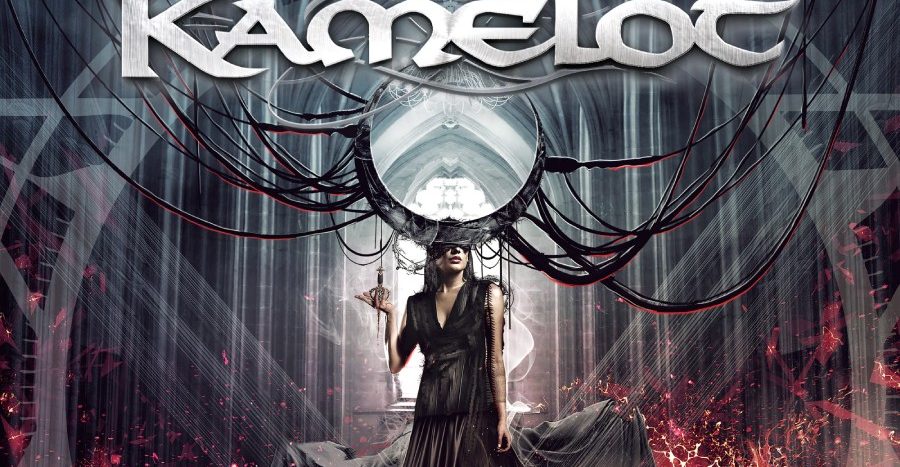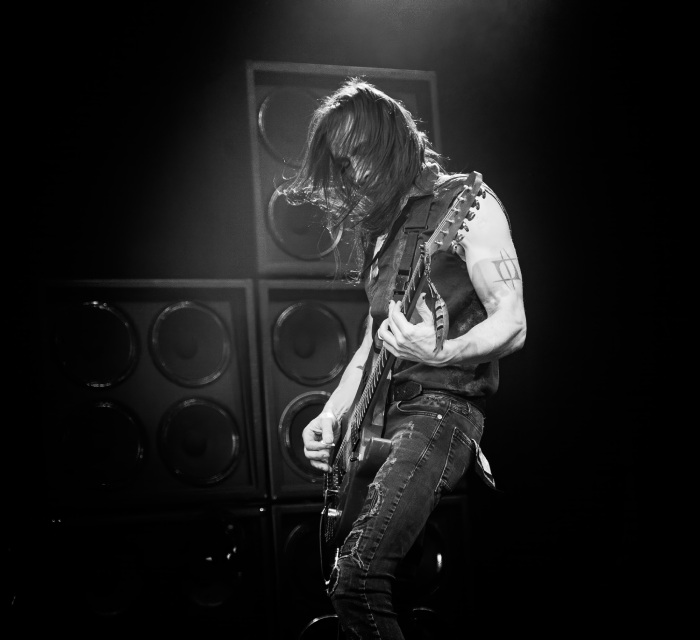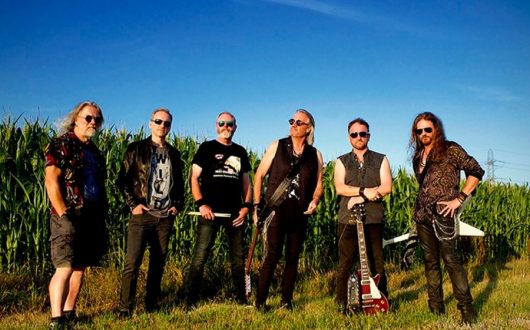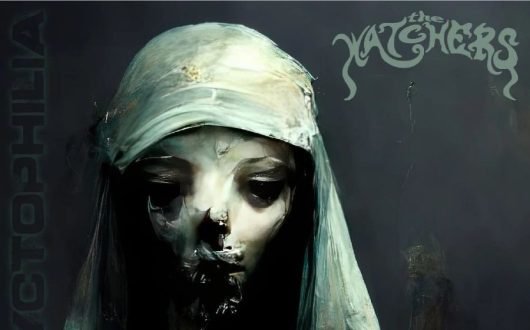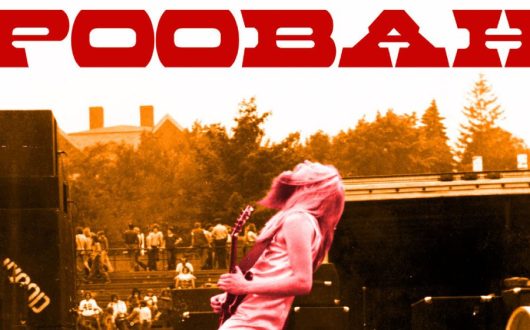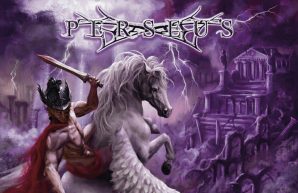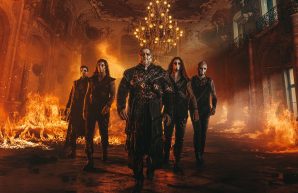Released By: Napalm Records
Release Date: March 17th, 2023
Genre: Symphonic Power Metal
Links: https://kamelot.com/
Line Up:
Tommy Karevik – Vocals
Thomas Youngblood – Guitars
Sean Tibbets – Bass
Oliver Palotai – Keyboards
Alex Landenburg – Drums
Tracklist:
1. Overture (Intro)
2. The Great Divide
3. Eventide
4. One More Flag in the Ground
5. Opus of the Night (Ghost Requiem)
6. Midsummer’s Eve
7. Bloodmoon
8. Nightsky
9. The Looking Glass
10. New Babylon
11. Willow
12. My Pantheon (Forevermore)
13. Ephemera (Outro)
I’ve had a bit of a complicated relationship with the American symphonic power metal band Kamelot over the years, to say the least. While the band has released some of my favorite albums of all time in Epica, The Black Halo, and Silverthorn, they’ve also released some albums which fell well short of my expectations. Their most recent output in particular has been rather hit-and-miss, with the aforementioned Silverthorn coming directly after Poetry for the Poisoned, easily my least favorite by the band, and then followed up by the rather lukewarm Haven. With their previous release, The Shadow Theory ranking somewhere in the middle of their discography for me, I had no idea what to expect with the band’s recently released 13th full-length album, The Awakening, but thankfully the band managed to surprise me in a big way. I was hoping to have an enjoyable album, with flashes of brilliance here and there, and instead, I got easily the band’s most cohesive and consistently entertaining release since Silverthorn, at times even being nearly on par with that album.
As usual, little has changed in between albums, with drummer being the only position to have changed since Silverthorn. This time around, Johan Nunez has been replaced by veteran drummer Alex Landenburg, who instantly fits in perfectly with the band, and delivers an excellent performance. Otherwise, this is largely the same lineup the band has had for the past several albums, and yet, there’s somewhat of a distinct feel to the album, feeling equal parts fresh and nostalgic. Nothing major has changed stylistically, as the band still plays the same blend of symphonic metal, power metal, and prog as always, with the power metal elements, in particular, being dialed up quite a bit compared to the past two albums, but for the first time in a while, it feels like the band is just playing naturally, instead of trying to force a particular mood. It’s hard to fully put into words, but where each of the past several albums had moments where it felt like the band was trying to be dark just for the sake of it, here it all comes off naturally, like the band is simply writing whatever songs they feel like, without trying to prove anything. There’s a distinctly lighter feel to a lot of the tracks, with some of their best melodic guitar work in quite some time, and even the darker tracks come off much better than on The Shadow Theory and especially Haven, where something felt just a bit off. I don’t know, it’s hard to fully explain, but regardless, something felt a bit off to me on some of the band’s more recent albums, but whatever it was, it isn’t there at all this time around, which is a huge relief.
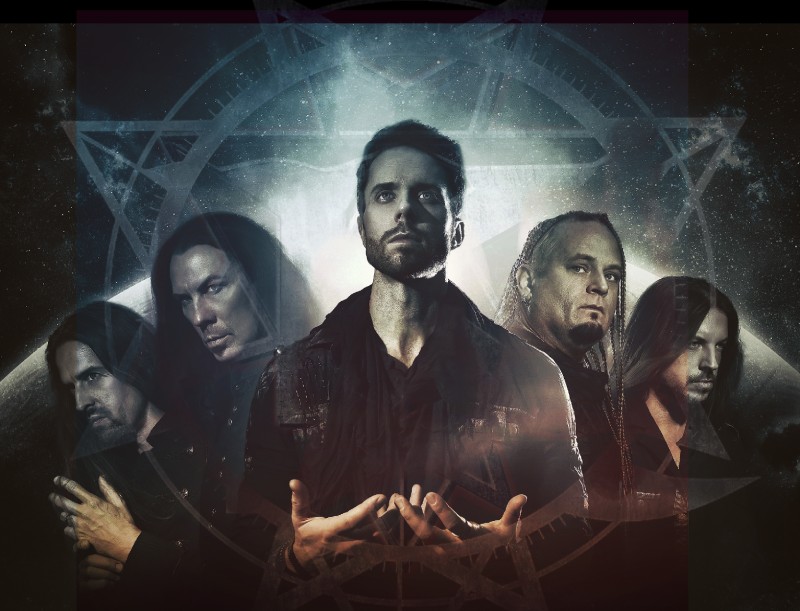
Fans of the band should know what to expect at this point, and there’s a ton of variety to the songs, as always. There are speedy, straight-up melodic power metal tracks such as “The Great Divide” and “Opus of the Night”, as well as some slower, moodier tracks like “Bloodmoon” and “My Pantheon”, a couple of ballads in “Midsummer’s Eve” and “Willow” and a catchy, radio-friendly single in “One More Flag in the Ground”. While there’s still plenty of heaviness at times, I find the guitar work in particular is very melodic for the most part, and those are the parts where the band excels, as they’ve always had a knack for writing excellent melodies with a distinct atmosphere and feel to them, and while the past few albums had traces of that, I especially notice it once again on this album. Keyboards are of course prominent as usual, though they’re largely in the background and serve as a backdrop instead of taking over fully like on The Shadow Theory, and there isn’t as much experimentation with electronic effects as on that album. Symphonic elements are grand and epic as always, with a couple of tracks, in particular, going all out with it, while other tracks have them serving more as a background to everything else. Production is fantastic, and performances are excellent across the board, with the musicians all doing a wonderful job, and Tommy Karevik sounds more at home on this album than on previous albums. He still has moments where he sounds a lot like Roy Khan, but I find those parts feel much less forced on this album, and he’s given plenty of opportunities to showcase his full range this time around. Overall, I think this is the strongest performance with the band.
One area where the band can be inconsistent is the songwriting, but thankfully The Awakening is one of their most consistent albums in that area. I was initially worried when I heard the first single, which I’ll mention shortly, but every other track is fantastic in its way, and the album manages to feel like a cohesive whole, while still being as varied as always. It very much reminds me of Epica and The Black Halo, with how there’s a lot of different things going on, but it all comes together wonderfully. Following the customary intro track, “The Great Divide” kicks things off in fine form, with some fantastic melodic guitar work right out of the gate, along with some furious drumming and epic symphonic arrangements. It slows down a bit during the verses, gradually building up towards a chorus that goes full speed ahead, while still being very melodic and having some excellent vocals from Karevik. It’s the kind of track the band has always excelled at, and it’s my favorite opening track from them since at least “Sacrimony”. Next is the third single “Eventide”, a slightly more atmospheric track, with more noticeable keys and even more epic symphonic arrangements, but it maintains the high tempo of the previous track, moving along at a nice pace during the verses, with bursts of heaviness, then speeding up some more for another wonderful chorus, again striking the balance between, speed, melody, and pure epicness, with the symphonic arrangements and vocal melodies being fantastic. There are bursts of heaviness and some darker moments throughout the song, but they fit in nicely, while the chorus itself is quite upbeat, as I prefer it to be.
I mentioned initially being a bit concerned after hearing the lead single, “One More Flag in the Ground”. The thing is, it’s a perfectly serviceable track, with a strong, catchy chorus, some cool atmospheric choral vocals, and an excellent guitar solo in the second half, but it lacks energy compared to many of the other tracks on the album, and it feels like it plods along a bit during the verses. There are bursts of heaviness, but even that does little to enhance the verses. Thankfully, though, the chorus is strong enough to carry the track, and it is a solid track overall if the weakest on the album. Things pick up once again with the second single “Opus of the Night (Ghost Requiem”). As the part in parenthesis would suggest, it very much feels like a successor to the title track of Ghost Opera, complete with some rather haunting chanting vocals from guest vocalist Kobra Paige, as well as an overall theatrical feeling to the symphonic elements. Otherwise, it’s a faster, heavier track than its predecessor, while also being one of the more progressive tracks on the album, alternating between slow, dark verses, which have a very mellow feel, and a huge, epic chorus where the tempo picks up, and Karevik is once again given plenty of room to deliver some fantastic vocals. Everything comes together to make it one of my personal favorites on the album, striking the perfect balance between speed, atmosphere, heaviness, epic symphonic arrangements, and big melodies.
Following one of the most epic tracks on the album, it makes sense that the band would tone things down, which is exactly what happens with “Midsummer’s Eve”, a very beautiful folk-infused ballad, with a guest appearance by cellist Tina Guo (who’s also on “Opus of the Night”, but I find her work far more noticeable on this track.) The cello combines with the keyboards for a very soothing, relaxing feel, and there are some beautiful melodies throughout, with Karevik once again at the top of his game, especially during the chorus. It’s a very calm and quiet track overall, but it does have a fantastic instrumental section towards the end, where the folk elements fully take over. Next is “Bloodmoon”, a more mid-paced track, which also has a slight folk feel to it, though it’s a heavier track overall, with some rather thick guitar work during the verses and instrumental sections, while the chorus is once again very melodic and uplifting, with a fantastic main melody. Despite being a slower track, it still has traces of classic Kamelot in the melodies and the overall feel, especially during the chorus, and it’s another outstanding track overall.
The hits keep coming with “Nightsky”, another classic feeling track. The verses are fairly laid-back and atmospheric, with the keyboards doing a nice job of setting the mood, and then the chorus speeds up fully and is one of the most upbeat, uplifting choruses on the whole album, with perhaps my favorite melodies the band has written since The Black Halo. There’s a very distinct feeling to the track, which is hard to describe, but it’s just so beautiful, and an absolute delight to listen to. My favorite track on the album. The momentum continues with “The Looking Glass”, which opens up with a melody that’s so similar sounding, I initially thought it was a continuation of the previous song. It isn’t, though, and the song soon changes, settling into a mid-tempo groove, with a darker, heavier sound, once again contrasted against a light, uplifting chorus with more huge, fantastic melodies and vocals. Karevik is allowed to be especially dynamic on this track, going for a huge high note at the end of the chorus, and it’s one of his better performances, for sure. The track itself does a nice job of alternating between heavy and melodic, as well as light and dark, and it’s yet another one of my personal favorites.
Perhaps the most epic and most symphonic-influenced track on the album is “New Babylon”, which very much has an Epica feel to it (the band, not the album.) It has massive choir vocals, including backing vocals from Simone Simons herself, who appears as a guest along with Ad Infinitum vocalist Melissa Bonny, the latter of whom is given plenty of space to work with, both with some light clean vocals during the chorus and some intense growls during a heavy section in the second half. It’s an epic, slow-building track with a fantastic chorus, paired up with more subdued verses and of course, that one explosive section where the death growls appear. The second ballad on the album is “Willow”, and while it’s less distinct than “Midsummer’s Eve”, it’s an excellent track in its own right, going for more of a piano ballad feel, with light symphonic backing, and it has a fantastic chorus, with emotional lyrics and another phenomenal performance from Karevik. Closing out the album is “My Pantheon (Forevermore)”, the darkest, most gothic-sounding track on the album. It has a very dark, atmospheric feel to it right from the beginning, with everything from the tone of the symphonic elements to the down-tuned, extra-heavy guitar work, haunting pianos, and vocals all giving the track a dark feel. It does open up during the chorus, but even then it’s still a very dark-sounding track. Towards the end, Melissa Bonny makes her second appearance, delivering more intense harsh vocals during a brief but intense section, which leads to a very calm, subdued ending. Closing out the album is “Ephemera”, an outro track that is very nice in its own right, but at least to me it feels rather unnecessary, and I think the previous track would have been a much stronger way to close out the album. I guess the band wanted to stick to their formula, though.
Kamelot is a band I never know what to expect from, when it comes to quality, as they’ve produced some absolute masterpieces over the years, along with a few big disappointments. Coming off the solid but unspectacular The Shadow Theory, I was hoping the band would at least be able to equal that album, but instead, they’ve greatly improved on it with The Awakening, releasing their best album since Silverthorn, and one of their stronger albums overall. It contains a bit of everything, with power metal fans, in particular, having a lot to look forward to, while fans of their darker, more symphonic-infused tracks also have a lot to be excited about, and longtime fans of the band can look forward to hearing some of their best melodies in quite some time. Overall, it’s a fantastic album, and with a five-year gap in between albums, the band very much sounds refreshed and at the top of their game.
Ratings: 9/10
Written by: Travis Green
My Global Mind – Staff Writer
Travis Green is a Canadian based writer for My Global Mind, with a particular passion for power metal, as well as an interest metal in all its forms.
